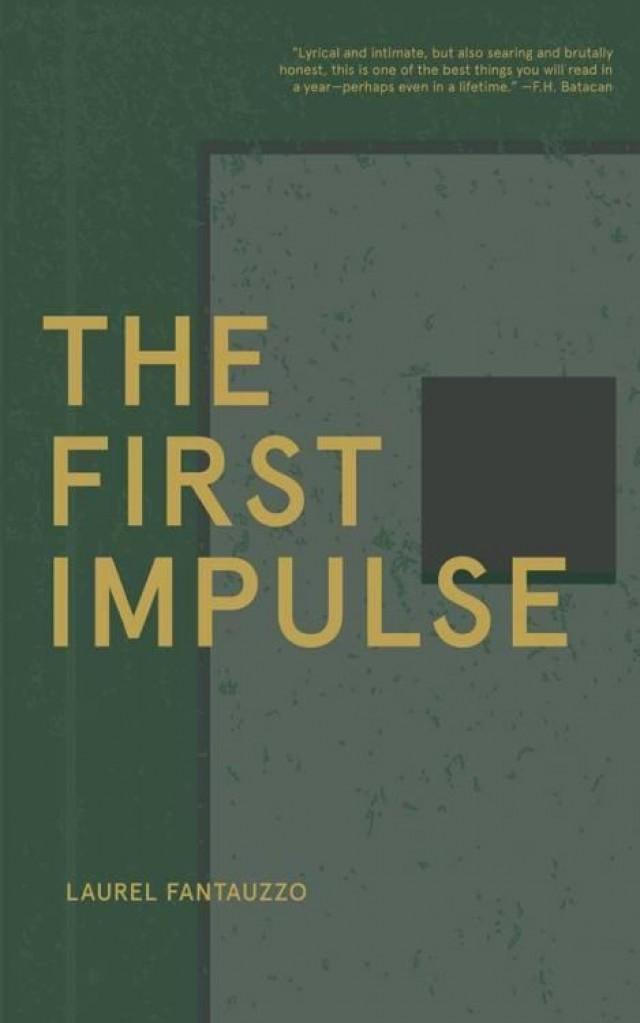'First Impulse' is a true-crime book that hits close to home
There are books you read to fly to another world, wishing to be entertained. Then there are books you enter to come face-to-face with your own troubled world, and maybe come away knowing it better.
And then there are those you linger in because you actually know the characters, real-world friends who also occupy the printed pages of a grisly double murder story that really happened.
“The First Impulse” is true crime, with seething questions that Filipino-American author Laurel Fantauzzo pursues doggedly through the modern Philippine labyrinth of poverty and impunity.
But this book is unusually close to home, the double murder occurring nine years ago this year, a few blocks from where I currently live, a short walk to EDSA.
The victims were people I knew, the film critic prodigy Alexis Tioseco and his equally brilliant Slovenian girlfriend Nika Bohinc.
Shortly before they were killed in 2009 in Alexis’ home by men allowed in by a new domestic helper, I had been messaging the 28-year-old Alexis about doing movie reviews for GMA News Online, which I was editing at the time. (Disclosure: Author Laurel Fantauzzo was also an essayist for the website and asked me to write one of the blurbs for the book).
The couple’s close friends who were among the first on the crime scene are also buddies of mine, especially the writers Erwin Romulo and Gang Badoy. The portraits, however, that Fantauzzo paints of this close-knit cohort of young achievers are much more intense than what my own encounters with them ever revealed.
She captures their anguish of discovering the slaughter of beloved friends, the shame of having to face on behalf of an entire country Nika’s distraught non-English-speaking father, and finally the desperate frustration of dealing with a lackadaisical police force that has to be bribed just to make the smallest effort to solve a hideous crime that left abundant clues.
Yet these grievous emotions feel like a foil for the outsized joy and affection that fill the pages that describe the lives of Alexis and Nika in the two short years they spent together, mostly in a Philippines where the European often felt bewildered. But she made the move for Alexis.
The title of the book, "The First Impulse", in fact are the first words of an Alexis sentence that ends with “is always one of love.” It is an unabashed account of what motivated him to write about Philippine cinema, to live in the Philippines alone away from his Canada-based family, to convince Nika to leave her own comfort zone to live in chaotic Manila.
It is this yin-yang of fondness and exasperation that will be familiar to those who love Manila and the Philippines despite everything.
“Slovenians like to say that theirs is the only country in the world with the word ‘love’ in it,” Fantauzzo writes. “But perhaps the landscape of the Philippines most accurately resembles the reality of love – a forever fragmented, hazardous archipelago. There will always be some weather that will make it difficult, some inevitable, natural break in the landscape between you, and you will have to make a difficult choice.”
The author knows something about the mysterious contradictions of being Filipino, in her case of being an Italian-Filipina-American who was drawn to the land of her mother even while being appalled by its normalized injustices.
Alienated from the Philippines, Alexis eventually found his true self in its underdog yearnings. The author clearly identifies with Alexis’ journey and draws inspiration from his leap of faith, two spirits in a Filipino diaspora rife with soul-searching for identity. The earnest question that Alexis once uttered will be recognizable to any idealist who discovers his or her roots as a young adult: “If everyone who can help the Philippines leaves, what’s going to happen?”
Laurel’s fascination with Alexis and with the fate of the star-crossed lovers is the engine that drives her investigation into their deaths. But one senses, even without the directness of Alexis, that Laurel’s first impulse is also love, a love for the country whose language she can barely speak, a love that fuels her longing to understand it.
Researching and writing the book is the author’s vehicle for knowing this country, her country by choice.
I had first read it in manuscript form two years ago, then decided to leaf through it again in recent days to help me navigate what this country is fast becoming.
Having grown up in California, Fantauzzo approaches her subject with a fresh detachment, seeking eye-popping knowledge about every-day things that most Filipinos take for granted or simply do not wonder about, such as the lives and living conditions of household help.
A post shared by Anvil Publishing (@anvilpublishing) on
Through Alexis and Nika, and her own encounters with it, Fantauzzo tells the story of contemporary Philippines.
“The First Impulse” is a brutally honest dissection of an infuriatingly flawed society on the verge of disruption. It was written shortly before the rise of Duterte, the murders of thousands, and the applause by millions; when one could still criticize the status quo without being swarmed by the offended with the zeal of religious fanatics. The frustration of not being able to comprehend this troubled new world drew me back to this book.
In unraveling the mystery of Criselda Dayag, the new hire in Alexis’ household suspected of letting the killers in, Fantauzzo brings the reader into urban poor communities, the dynamics of internal migration, the relations between boss and domestic servant in a quasi-modern society.
Much of the book is consumed by the hunt for Criselda, and theories of whom the mastermind might be, with an extensive discussion of whether that could be the flamboyant director Carlo J. Caparas, who had engaged Alexis in a heated argument about cinema on Cheche Lazaro’s talk show.
It turns out that, no matter how guilty she is, Criselda is not merely a helper from hell, a middle-class matron’s worst nightmare. She is like millions of Filipinos looking for cracks in the system that she can exploit, typically “maparaan” (resourceful), except that she crossed the line into being an accomplice in a double murder.

When Criselda (spoiler alert) is finally found, she is portrayed not as a devil incarnate, but yet another incorrigible victim of the system. She clears Caparas of involvement, and insists that the killings started as a robbery by a gang but ended up with Alexis resisting the home invaders. One of Nika’s Slovenian friends wryly remarks that the murder plot by a film director offended by Alexis’ criticism might have been the more apropos ending to their lives.
Criselda had changed her appearance and almost got away with murder, if not for the persistence of Alexis’ family and friends. His Canadian siblings were crushed by the police’s lack of action, more accustomed they were to law enforcement in Canada and other Western countries where victims’ families simply cooperated and then waited for the cops to solve crimes.
In the Philippines, the police had to be cajoled, threatened, bribed, and frequently reminded that these murders needed to be solved. And this was a high-profile case that reverberated internationally.
Yet it was just one of 4,947 murders in the Philippines in 2009, cited in the book as the highest in Asia, but a figure that seems quaint now in light of the 20,000 killings mentioned in the Duterte administration’s “accomplishment report” for 2017.
(As I write this, there is news that Criselda has been convicted of robbery with homicide while her three accomplices still remain at large.)
In a way, the narrative reveals a clash between two world views: one that is rooted in modern concepts of evidence and fact-gathering; and another that leans on medieval superstition and belief in the supernatural to explain things, much easier to do than painstaking detective work.
Fantauzzo shows that even some of her more educated Filipino friends believe in deriving clues from spirits, rather than through the more pedestrian task of checking for hard physical evidence.
One of the Philippines’ only trained forensic pathologists, Dr. Raquel Fortun, is quoted towards the end of the book: “We Filipinos are not really that serious when it comes to finding the truth.”
It’s a searing indictment, and much of the book is spent exploring its consequences for law enforcement and victimized citizens, seen through the prism of this one sensational case. The missing evidence, police apathy, and generally sloppy investigation all mirror the truth of Fortun’s verdict.
The extensive research that went into this book stands as an antithesis to the cavalier attitude towards facts. The burning questions about the murders she asks of the police that take up three pages of the book remain unanswered not because of any apparent desire for a cover-up and not because of political expediency; tokhang and the charade of serial nanlaban (resisting arrest) were still years away. The lack of answers just seemed typical police indifference.
We learn that even if Criselda was eventually arrested, she had already had a warrant for her arrest when Alexis hired her, the information not reaching Alexis despite his vetting. With a less careless police, and a public more demanding of the truth, Alexis, Nika and many others would be alive, and justice would not be so elusive in the Philippines.
What do we make now of where we are going? Instead of forward to greater respect for facts, it’s become brazenly acceptable to look falsehood in the eye and declare it the truth.
Technology has empowered nearly everyone, but it has a special power to propel fake news that demonizes critics, justifies killings and fuels today a culture of impunity on steroids.
At one point, when she realizes she had not confronted a person with allegations she had heard about him, Fantauzzo’s does some soul-searching and concludes, “My silence was driven by my fear,” as relevant a statement today as it was at that time.
We are nowhere near addressing Dr. Fortun’s tragic take on the Philippines’ problem with facts. If anything, there is an even more awe-inspiring denial of obvious problems.
Laurel Fantauzzo’s book reminds us of the value of finding and marshaling facts, and pointing a laser at what we still don’t know. Through the crooked, broken arc of this heinous crime, we can discern that the Philippines’ greatest problem on the eve of the Duterte era was not drug addiction, although it does exist in spades.
It was probably the inability to solve crime. Criselda has been convicted, but the three killers are still out there, nine years and tens of thousands of unsolved murders later. — LA, GMA News
“The First Impulse,” by Laurel Fantauzzo, Anvil Publishing, Inc., 2017




